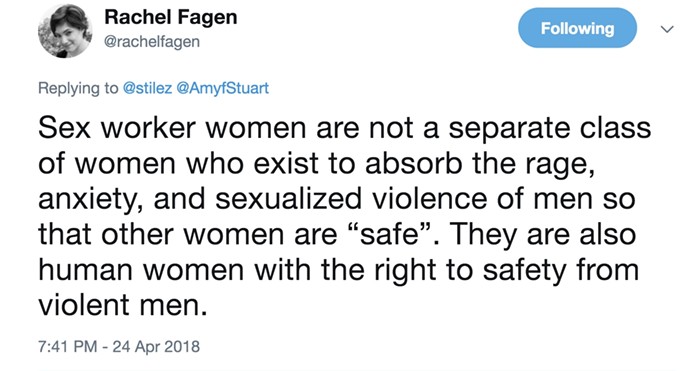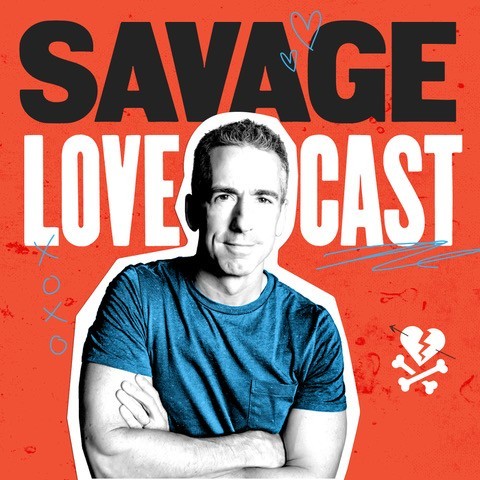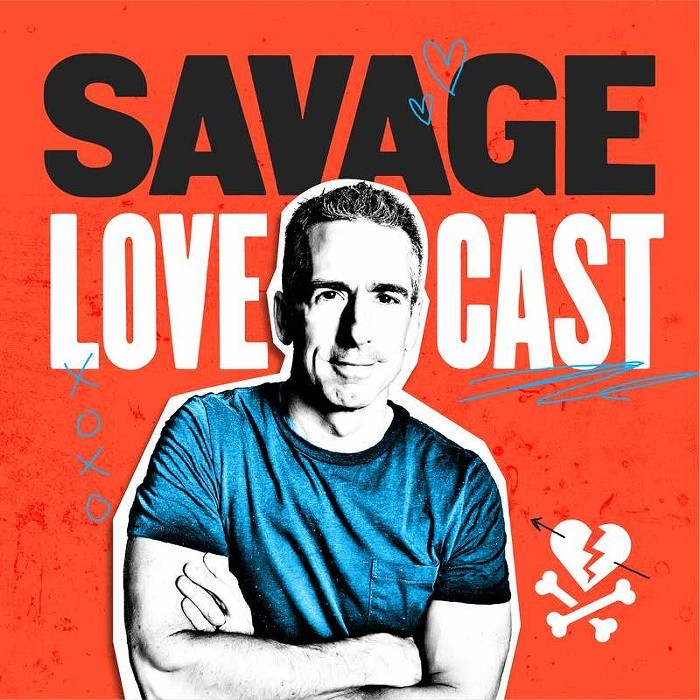
Before I say anything else: I agree with Rachel Fagen. She tweeted the above in response to someone who asked why "incels" don't just go see sex workers. I have good friends who do sex work—women and men—and they're not human shields. Their lives are valuable and, like Fagen says, they're not here to soak up male rage. They deserve safe working conditions and they deserve our respect—not despite the work they do, but because of it.
And let me say this: I have no sympathy for "incels" lurking in dark corners of the Internet cheering on misogynist terrorists. I have no sympathy for anyone who picks up a gun or gets in a van to mow down women on their way to class or work. And anyone who attempts to pin the blame on women or feminism for George Sodini or Elliot Rodger or Alek Minassian is an asshole.
Now let's talk about incels. Alex Heard explains who they are in The Guardian today…
Incel is short for “involuntarily celibate”. The term rose to prominence because of its adoption by a subsection of the “manosphere”, a loose collection of movements united by misogyny that also includes some men’s rights activists, pick-up artists, and Mgtow/volcel—heterosexual men who refuse to have sex with women for political reasons. Men who identify as incel tend to congregate on a few forums, including the message board 4chan, the forum SlutHate and, until the community was banned from the site, the incel page on Reddit. They are united by the fact that women will not have sex with them, usually attributed to shallow obsessions with looks or superficial personality, and by their hatred of “Chads” and “Stacys”, the men and women who have sex.
Sexual deprivation can make a person miserable, even suicidal. I hear every day from men and women in their twenties, thirties, forties, and up who are virgins or haven’t had sex for decades; some have never received so much as a kiss. Most are deeply unhappy—and none who’ve contacted me identified themselves as “incels,” and no one who's written me was contemplating acts of violence. But sexual and romantic deprivation does create misery, and, as a society, we seem fine with that. People who can't get sex are often told that sex and intimacy aren't like air or water—a person deprived of air isn't going to live for very long but no one has ever dropped dead as a result of being deprived of sex. (Loneliness, however, can hasten death; it may be a greater risk factor for early death than smoking or obesity.)
There are sexually deprived people out there who do identify as incels, as many learned over the last 24 hours. Instead of feeling depressed or blaming themselves (like the sexually deprived people who reach out to me), these involuntary celibates are filled with rage and blame others. No, wait: they blame women. The incel “community” is entirely male and, so far as I can tell, entirely straight. And when an incel with social or mental health issues—issues that contributed to his being an “involuntarily celibate” in the first place—violently attacks women (men are often killed too), the online incel breaks into cheers.
I hear from involuntarily celibate women frequently. They send me long, sad letters. But here are no examples of women gunning down good-looking men in aerobics classes (Sodini) or shooting young men outside frat houses (Rodgers) or running down random men on a sidewalk (Minassian). It's the toxic combination of male entitlement (men feeling entitled to women's bodies, attention, and adoration), the misogyny that grows like a black mold all over the Internet (maybe “ending the Internet as we know it” wouldn't be such a bad thing), and the male propensity toward violence that creates the kind of carnage we saw yesterday in Toronto.
Before I go any further (I’m going to qualify the shit out of this post knowing parts of it will be taken out of context anyway): I don't think throwing sex workers at violent, deranged incels will solve the violent, deranged incel problem. By the time a guy is incel-identified, it’s too late. No, our culture has to change in enormous ways to solve this problem and others. First and most importantly, men have to stop being socialized to believe they're entitled to women's bodies—the bodies of female strangers, the bodies female friends, the bodies of female partners. This belief leads some men to conclude they’ve been wronged when romantic and/or sexual success doesn't come easily to them or at all.
Another cultural transformation that’s long overdue and goes hand in hand with the notion that women, not men, own their own bodies: adults who do sex work of their own free will shouldn’t be stigmatized (or treated like criminals) and adults who hire adults doing sex work of their own free will shouldn’t be stigmatized (or treated like criminals). The former cultural transformation will solve the “incel” problem; the latter will lessen the misery of sexual deprivation, i.e. involuntary celibacy.
We are capable of recognizing the legitimacy of sex work—even the moral good of sex work—in certain cases. When a mother hires a sex worker to meet the sexual needs of her profoundly disabled son, newspapers publish stories with headlines like “The sex workers giving disabled people a chance to live out their dreams”:
[Many] mothers call the sex and disability helpline, which I run, worried that their disabled son is physically unable to masturbate and desperately needs an outlet. Hiring a sex worker is one option. They can find responsible sex workers on the TLC-Trust website which was created in 2000 by myself and a disabled man, James Palmer, who was sad about being a virgin in his mid 40s. The hundred or so sex workers who have profiles on the site say they each see about eight disabled clients a month... If a disabled person loses their virginity with a sex worker in a way that teaches them about their body and how to please a partner, it can set them up to become a confident, knowledgeable and sexually skilled individual who can proceed to finding a partner. However, if they have a progressive condition, their life can feel too full of disappointment and loss to try to find a partner and they may prefer to stay seeing sex workers, with whom a good outcome is guaranteed.
There are people who are so profoundly physically disabled that their chances of finding sex and/or romance the way the most people do—dating apps, social circles, chance meetings in bars and clubs or other venues—are slim to impossible. We see our way clear to allowing them to seek physical comfort and sexual release in the arms/between the legs of sex workers. Hollywood makes films that portray disabled people buying sex in a sympathetic light.
Well, there are men out there who are so profoundly socially disabled—so socially awkward or maladapted or damaged—that they just as incapable of finding finding sex and/or romance through “normal” channels as a quadriplegic confined to a bed in his mother’s home.
These are the guys who sometimes find their way to hateful, misogynistic online incel forums.
I don't want any sex workers I know—I don't want any sex workers at all—to be alone in a room with a man filled with rage because he believes he was unfairly denied access to women’s bodies. I also don’t want sex workers to be alone with men filled with rage about “having” to pay for sex if paying for sex is the only way they can get it. Stigmatizing men who pay for sex as losers and running emasculating PSA campaigns ("Real Men Don't Buy Girls ," “Cool Men Don’t Buy Sex”) makes it harder for men who may be profoundly socially disabled to access the sex they can have—paid sex—without feeling worse about themselves than they already do.
One way to de-stigmatize sex work...
The rest of us, those of us who don't "have to" pay for sex, could acknowledge this awkward truth: we all pay for it. We don’t all pay cash but we all pay. All sexual and romantic relationships involve an exchange. In most cases the goods (sexual and/or emotional) exchanged for services (sexual and/or emotional) are intangible or physical and the exchange is of roughly equal value. (Or we convince ourselves it is.) It's a barter system: “a system of exchange where goods or services are directly exchanged for other goods or services without using a medium of exchange, such as money.” I give my husband emotional, social, and sexual support and attention in exchange for the same from him. If we weren’t both paying up and paying in emotionally, socially, and sexually, our relationship would collapse. A sincere bond of affection prompts us to pay up and pay in, yes, but we make our payments.
We have an example on the national level of a deeply commodified marital relationship that involves an exchange but clearly isn't sustained by a bond of affection:
It's not clear why she was there, but according to this month's Glamour, Donald Trump's wife, the model Melania Knauss, recently found herself addressing a New York University business school class. Showing an attitude that would probably have been judged inappropriate on Mr. Trump's television show, "The Apprentice," one student asked the current Mrs. Trump—she is No.3 for those keeping score—if her husband weren't rich, would she still be with him. Her response? "If I weren't beautiful, do you think he'd be with me?"
I mean, come on.
De-stigmatizing sex work won't save us from incels or incels from themselves. (An incel attack is always a suicide mission; Sodini and Rodgers killed themselves, Minassian begged a cop to kill him.) But if we can manage to stop socializing men to believe they are entitled to women's bodies and stop stigmatizing and punishing sex workers and sex buyers—if we can stop telling men who "have to" pay for sex that they're losers or monsters or not real men and acknowledge that we're all paying for it somehow—male entitlement will be less likely to combine with sexual deprivation and explode.
Like I said, I have no sympathy for the self-identified, ranting, raving "incels" on online forums. I do, however, sympathize with the plight of people—men and women—who experience sexual and romantic deprivation and are miserable (but not hateful) as a result. Those of us in the advice racket offer lonely, inexperienced, and sexually deprived people support, pointers, and encouragement. But following the standard-issue advice doesn't always alleviate their misery. A culture that honored sex workers and consensual sex work and didn't shame people for purchasing sex? That could alleviate a lot of misery. And it would help prevent incels before they happen.


















